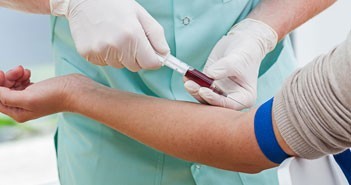Breath test shows promise for oesophageal and gastric cancer diagnosis

An international team of researchers from the UK and the Czech Republic have developed a breath test for non-invasive, rapid diagnosis of oesophageal and gastric cancer. Their first study recently published in Annals of Surgery outlines how they measured volatile organic compounds (VOCs) in breath to produce results within minutes.
Oesophageal and gastric cancer produce a distinctive smell of VOCs in exhaled breath. The researchers quantitatively measured VOC levels using a selected ion flow tube mass spectrometer, and were able to identify those that are present at significantly higher concentrations in patients with these cancers.
In their study, the team analysed breath samples of 210 patients at Imperial College Healthcare NHS Trust (UK). The test identified patients with malignant or benign oesophageal cancer with 90% accuracy. It can also be used to detect gastric cancer tumors.
Oesophageal and gastric cancer rarely cause noticeable symptoms when they first develop, and are therefore generally diagnosed in advanced stages. By this time, the cancer may have already spread to other parts of the body, leading to poor long-term survival rates (13% and 15%, respectively, in the UK). Currently, an endoscopy is the most common method of diagnosis. Disadvantages of this procedure include its invasive nature, the high cost and the proportion of negative results – in the UK only 2% of patients referred for an endoscopy are diagnosed with oesophageal or gastric cancer.
In contrast, the new test is non-invasive, cheap, fast and easy to perform. George Hanna, lead author of the study and Director of NIHR-Diagnostic Evidence Cooperatives at Imperial College London (UK), commented: “Our breath test could address these problems because it can help diagnose patients with early non-specific symptoms as well as reduce the number of invasive endoscopies carried out on patients, which often lead to negative results. Diagnosis at an early stage could give patients more treatment options and ultimately save more lives.”
Although similar breath tests that distinguish benign tumors from malignant ones do exist, the researchers noted that these are unable to quantify the amounts of VOCs present, and have longer processing times.
Following the encouraging study results, a larger trial is now being planned with 400 patients from three hospitals in London.
Source: Researchers develop new breath test to diagnose oesophageal and gastric cancer.






